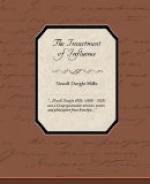Here is Sir William Napier writing, “I am now old and feeble and miserable; my eyes are dim, very dim, with weeping for my lost child,” and went on bound midst the thick shadows. Or here are the man and woman, set each to each like perfect music unto noble words, and one is taken—but Robert Browning was left to dwell in such sorrow that for a time he could not see his pen for the thick darkness. Here is the youth who by one sin fell out of man’s regard, and struggling upward, found it was a far cry back to the lost heights, and wrote the story of his broken life in the song of “the bird with the broken pinion, that never flew as high again.” Sooner or later each life passes under bondage. For all strength will vanish as the morning dew our joys take wings and flit away; the eye dim, the ear dull, the thought decay, our dearest die. Oft life’s waves and billows chill us to the very marrow, while we gasp and shiver midst the surging tide. Then it is a blessed thing to look out through blinding tears upon a friendly face, to feel the touch of a friendly hand and to know there are some who “remember those in bonds, as bound with them.”
Now this principle of social sympathy and liability gives us the secret of all the epoch-making men of our time. Carlyle once called Ruskin “the seer that guides his generation.” More recently a prominent philanthropist said: “All our social reform movements are largely the influence of John Ruskin.” How earned this man such meed of praise? Upon John Ruskin fortune poured forth all her gifts. He was born the child of supreme genius. He was heir to nearly a million dollars, and by his pen earned a fortune in addition. At the age of 21, when most young men were beginning their reading, he completed a book that put his name and fame in every man’s mouth. “For a thousand who can speak, there is but one who can think; for a thousand who can think, there is but one who can see,” and to this youth was given the open vision. In the hour of fame the rich and great vied to do him honor, and every door opened at his touch. But he turned aside to become the knight-errant of the poor. Walking along Whitechapel road he saw multitudes of shopmen and shopwomen whose stint was eighty hours a week, who toiled mid poisoned air until the brain reeled, the limbs trembled, and worn out physically and mentally they succumbed to spinal disease or premature age, leaving behind only enfeebled progeny, until the city’s streets became graves of the human physique. In that hour London seemed to him like a prison or hospital; nor was it given to him to play upon its floor as some rich men do, knitting its straw into crowns that please; clutching at its dust in the cracks of the floor, to die counting the motes by millions. The youth “remembered men in bonds as bound with them.” He tithed himself a tenth, then a third, then a half, and at length used up his fortune in noble service. He founded clubs for




